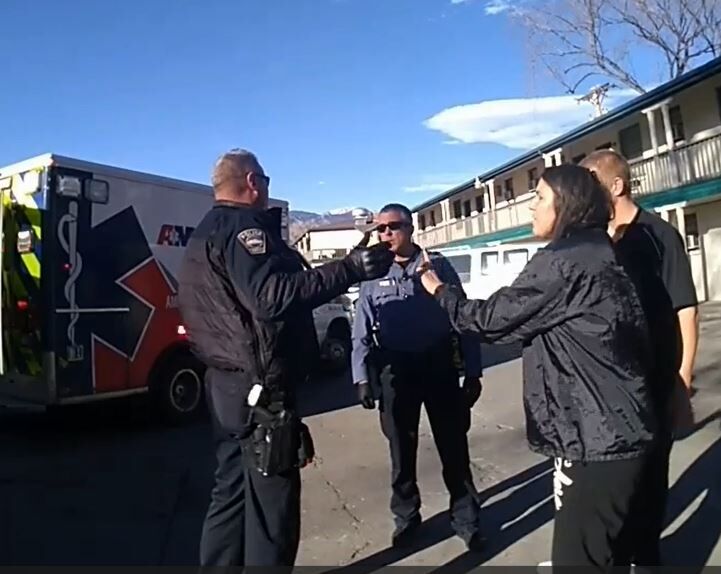Federal judge sends illegal arrest lawsuit against Colorado Springs officers to trial

A jury will decide whether Colorado Springs police officers unlawfully arrested and searched a woman who, moments prior, helped resuscitate a man who had stopped breathing from a drug overdose.
Colorado Springs asked U.S. District Court Senior Judge Christine M. Arguello to find its officers acted reasonably when they handcuffed and cited Sasha Cronick for “failure to disperse” from a motel parking lot where first responders were rendering aid to the unconscious man. However, Arguello believed a jury could ultimately find Cronick’s arrest did not stem from any police order to leave the scene, but rather because she shouted at officers after being touched.
“The Court therefore finds that, viewing the evidence in the light most favorable to Plaintiff, no reasonable officer would have believed that they were justified in arresting Plaintiff merely because she yelled,” Arguello wrote in a June 20 order.
At the same time, she agreed officers were not liable for using excessive force when handcuffing Cronick, as there was no evidence of anything more than a minimal injury.
The circumstances of Cronick’s arrest at the Sun Springs Motel in Colorado Springs were captured on her own cell phone and the body-worn cameras of multiple officers.
On Dec. 12, 2018, Cronick heard shouts for help at the motel, where she was staying. A man was lying unconscious outside of a guest room, apparently due to a drug overdose.
Cronick called 911 and talked with a dispatcher while simultaneously recording video. The footage showed Cronick instructing another woman how to perform chest compressions and mouth-to-mouth resuscitation. Their efforts resulted in the man beginning to breathe again moments before first responders arrived.
“Sasha, you did a great job today. Thank you,” the dispatcher told her.
Cronick remained nearby, recording on her phone and intermittently answering questions about what happened. Officer Christopher Pryor then walked up and learned Cronick was the one who called 911. He asked for her name and room number, but she responded she was “not answering questions like that,” then mentioned “police harassment.”
“Why don’t you leave the immediate area,” Pryor said, touching her out of view of his body-worn camera.
“Get your f—–g hands off me. Don’t f—–g touch me,” Cronick screamed.
“Lighten up, lady,” Pryor said. “I asked you to leave the area.”
Other officers gathered around Pryor. Cronick began demanding their names and, in response, Pryor and Officer Robert McCafferty placed her in handcuffs. It was unclear from the video whether the men pushed her to the ground or if Cronick “went limp,” as the defendants argued.
Pryor took Cronick to his car, where he began yelling at her and she started to cry.
“My hands are gonna be on you when I need to control you. Quit telling me what to do,” he said.
Pryor told Cronick she had committed obstruction and that she was likely under arrest. He also disputed that he grabbed her.
“The minute my hand brushed your side to guide you over, you freaked out. I barely touched you, lady,” Pryor said.
Sgt. Michael Inazu reviewed the body-worn camera footage and Cronick’s cell phone video. He agreed things “could have been handled differently,” but informed Cronick she would receive a citation because she was “told to step back and you refused to step back.”
“I’m gonna sue the s–t out of you,” Cronick responded.
Cronick went to trial in municipal court for the charge of failure to disperse. A judge agreed she came “dangerously close” to being convicted, but it was unclear whether Pryor had ever actually given her an order to leave, resulting in her acquittal.
Cronick then sued the officers and the city of Colorado Springs.
“Sasha Cronick never imagined that one of her most heroic moments would become one of her most painful,” her lawyers wrote. “When Defendant Pryor grabbed Sasha Cronick and pushed her towards the middle of the motel parking lot, there was no probable cause (or reasonable suspicion) to believe that Ms. Cronick had committed any crime.”
Last year, Arguello dismissed Cronick’s claim against the city itself, but largely allowed the lawsuit to proceed against the officers for unlawful arrest, illegal search, excessive force and malicious prosecution.
The defendants then asked Arguello to resolve the case in their favor without a trial. They argued there was probable cause to arrest Cronick for her conduct. In support, they submitted two statements from emergency medical technicians who responded to the motel.
“Adding to the danger and unpredictability, Cronick hindered and obstructed the performance of my duties,” wrote Austin C. Pugh in an affidavit from December 2022, four years after the encounter. “I was relieved when Officer Pryor put himself in between Cronick and myself, moving Cronick father away from the emergency medical treatment scene.”
Arguello, however, determined that a jury could find Cronick did not pose a threat or otherwise breach the peace, except for her yelling in response to being touched. Yelling alone, Arguello noted, does not provide probable cause for a crime, and the municipal judge already found Cronick not guilty of her charged offense.
“The parties vigorously dispute whether Pryor issued an ‘order’ to Plaintiff that she refused to obey. After viewing the body worn camera, the Court finds that it is a question for the jury whether Pryor ever ‘ordered’ Plaintiff to leave the scene,” Arguello wrote.
She added that while the video footage showed Cronick had not done anything that warranted more than a minimal amount of force, Cronick also sustained no major injury from being handcuffed. Therefore, the officers received immunity for the excessive force claim. Finally, Arguello sided with the defendants on Cronick’s malicious prosecution claim, as well.
There is no trial date currently set. Since Arguello’s order, the defendants have asked her to sanction Cronick, potentially by dismissing the lawsuit, because Cronick allegedly deleted evidence and failed to disclose other relevant information.
The case is Cronick v. Pryor et al.













